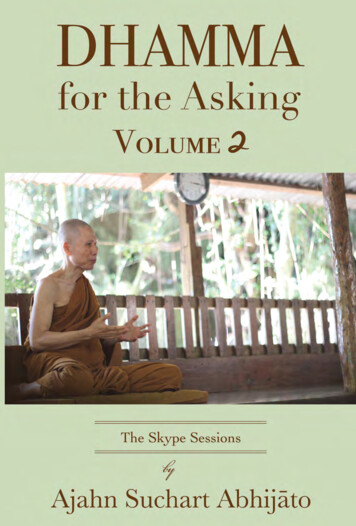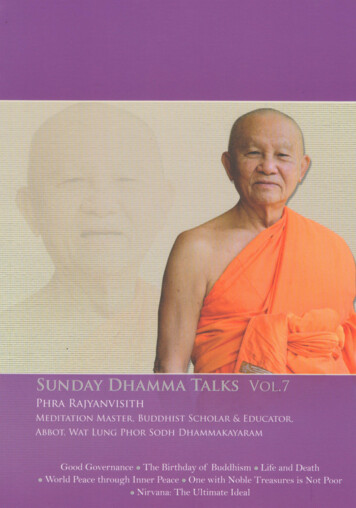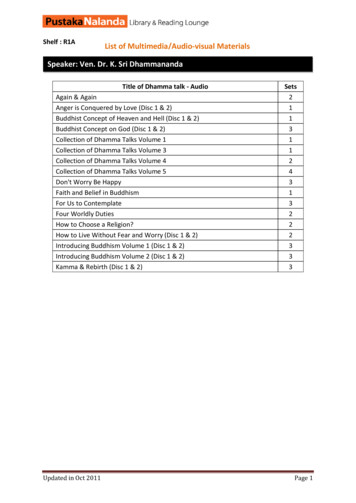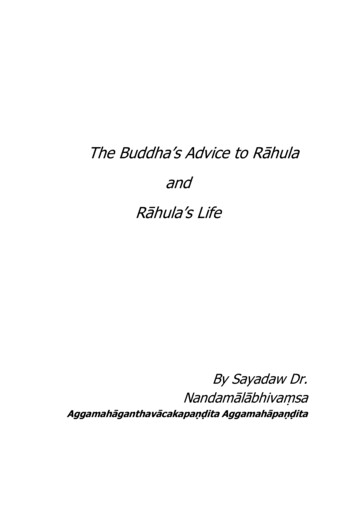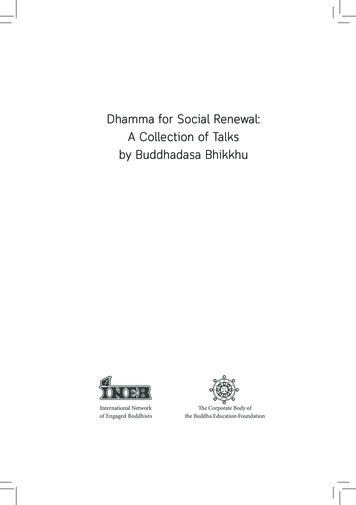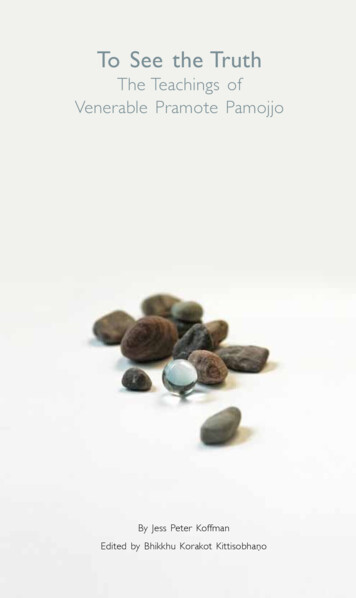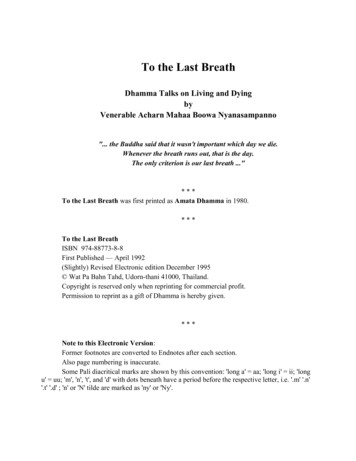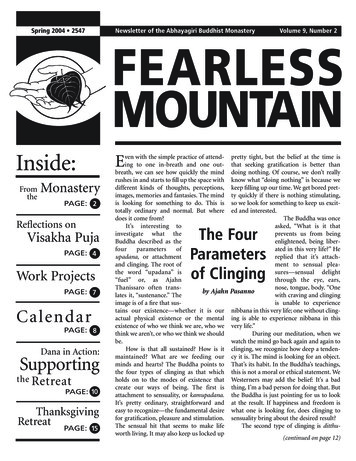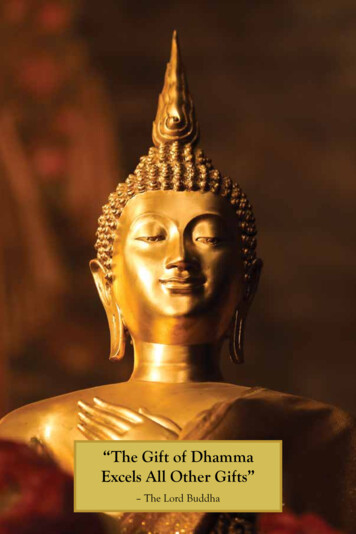
Transcription
Dhamma Talks byVenerable Luangpor Pramote PamojjoCompiled and Translated byVenerable Luangpor Pramote Pamojjo’s Followers
Venerable Luangpor Pramote PamojjoCompiled and translated byVenerable Luangpor Pramote Pamojjo’s followersCopyright 2015 by Luangpor Pramote Pamojjo’sTeaching Media Fund. All right reserved. Printed in Thailand.No part of this book may be used or reproduced in anymanner whatsoever without written permission.First paperback edition published in August 2016,5,000 copiesPublished and printed byPrima Publishing Company Limited342 Soi Pattanakarn 30,Suanluang, Bangkok 10250 ThailandTel. m/PrimaPublishing
ForewordSometimes, certain words of wisdom maysnowball into something that could changeone’s life.Venerable Luangpor Pramote Pamojjo is ateacher, who possesses a remarkable skill ofcapturing the attention of the audience withdiverse backgrounds and making everyonefeel the teachings are directly for them. Countless numbers of people have their lives changed after listening to his teachings after onlya few times.Some of Luangpor Pramote’s followers, whoare aware of how valuable his teachings are,have selectively compiled his words of wisdomtaught on different occasions into this published book, with an aim to motivating the
readers to follow the noble path and achieve itsfruits, as first the Buddha and then our belovedteachers and masters have accomplished.Upon the mind being motivated by these wordsof wisdom, we hope the readers practice accordingly to achieve real breakthroughs in life.Venerable Luangpor Pramote Pamojjo’s followers13 April 2015
The mindthat wanders off
It is normal for the mind to wander off. Thenature of the mind is that it wanders off. So,when it wanders off, just be aware of the happyand unhappy feelings, and good and badmental states that occur. Letting the mindwander may sound like it is not correct practice. However, it is actually a good thing todo, because the mind wandering off allows usto make contact with sense objects, and thenthis causes the feelings to change.The mind making contact with objects iscalled phassa, which causes pleasant, unpleasant and neutral feelings. Through feelings, defilements can arise, which are mental formations. We can see that the mind works by itself,fabricating states after making contact withsense objects. The mind working is known as6
state of existence. Watching all of this workingis what we call studying the Dhamma.Luangpor Bhud taught us to practice bysimply being mindful when we “stand, walk,sit, sleep, eat, drink, do things, speak, andthink”. We can think but just think with mindfulness. Who stands? Who walks? Who sits?Who sleeps? Who eats? Who drinks? Whodoes things? Who speaks? The body is theone that stands, walks, sits, sleeps, eats,drinks, does things and speaks. Who thinks?The mind is the one that thinks. Observe thatit is working on its own. It’s not us. So do notbe afraid when the mind wanders off.Being mindful when the mind wanders offcan bring wisdom. The mind that refuses to goout and stays still is concentration (samatha).7
It is one kind of samdhi. However, if the mindwanders off without mindfulness, it is deluded.Therefore, there is a thin line between developing wisdom and having delusion.If we are mindful, when the mind wanders off to make contact with objects, we obtain mindfulness on the path to wisdom. On theother hand, if the mind wanders off to makecontact with objects but mindfulness is notcultivated, it’s in delusion. Luangpor Bhud said,“There is a thin line between being absentminded and gaining awareness.” So, do not beafraid. It is common for the mind to wander off.Luangpu Dune said, “It is the nature ofthe mind to wander off. However, the mindwandering off without mindfulness is the cause8
of suffering. The result of the mind wanderingoff without mindfulness is suffering. When themind wanders off, if mindfulness is kept in tact,observing it as it is, that is developing thenoble path. The result of having mindfulnesswhen the mind wanders off is the end of suffering.”He didn’t say the mind must not wanderoff.This is extracted from the transcription ofLuangpor Pramote Pamojjo’s teaching.14 November 2014The transcription was transcribed from the originalaudio record of Wat Suan Santidham Series No. 57Track: 571114B9
Dhamma practicefor Parents
We can practice while raising a child. Some sayit is difficult to do so as kids need attention.Well, you’re the one who has created them.Some, who do not have kids, go seek helpfrom a doctor in order to get one. You’ve askedfor it yourself, so it’s not for you to complain.We can still practice while raising a child. Wedon’t have to put away our child in a nurseryso that we can practice. It’s needless to do so.Whom among you has ever fed yourchild? If you have a child, you must have haddone it at some point. Have you ever felt thatyour child is adorable when he finishes off hismeal and enjoys the meal? Well, when you feelthat he is adorable, you just have to be awarethat you feel the love toward him. Just likethat! That’s Dhamma practice.12
On another day, he refuses to eat, refuses to chew, and you also have to rush towork. There is a lot of work to do at home.You couldn’t rely on your husband because hehas already gone somewhere else. A lot ofhousehold chores are pending and your childstill refuses to swallow the food. You are frustrated about when or if he is going to finishhis meal. When you are angry, just be awarethat you are angry. If your child makes youangry by making a mess at home, just beaware that you are angry.One day, your child behaves nicely. He’sbeen nice for five minutes. You are pleased.Just be aware that you are pleased. Now thathe’s been well-behaved for too long. He looksso calm that you start to be worried that he13
might be sick. He has never been this calm formore than five minutes and now he’s beensitting still for half an hour! You are worried.Just be aware that you are worried. This is aDhamma practice.Can we see that our mind constantly changes? We can practice while raising a child. However, I wouldn’t recommend using our husband or wife instead of our child as a subjectof meditation. If we practice by using our husband or wife as a subject of meditation, wemight feel angry. We’ll only see the uglinessif we contemplate our wife as a corpse or foulness (asubha). If we want to use this type ofDhamma practice, we’d better observe ourselves as a corpse or foulness. If we contemplate our wife instead of ourselves, we might14
feel that our wife is disgusting and we have tofind a new one. That is troublesome. So justuse our children as a subject of meditationbecause we have to take care of them andcannot abandon them. When they make usfeel love, just know it. When they make us feelfrustrated, just know it. Observe our mind thatconstantly changes. This is Dhamma practice.Observing our own mind is a Dhamma practicethat is suitable for this era.Eventually, we will realize that the affectionate feeling that we have for our children isonly temporary. This may seem surprising forparents. We keep observing this by ourselves.If we don’t observe our own mind, we might useoverly harsh punishment on our children whenthey provoke us. Some parents may get stress15
from somewhere else, but they take it out ontheir children. It’s such a pity for these children.However, having parents like this is simply theconsequence of bad karma. So we keep observing our own mind so that we won’t hurtour children nor spoil our children so muchthat they can’t do anything by themselves.These days, Thai people raise their children poorly. We are all Thais here. Don’t replaceyour attention to them with IT gadgets. Yourattention is irreplaceable and is very dangerousto do this. Some let their kids play with a tabletso that they can have free time. Once they havefree time, they watch soap operas. This is awaste of time. The kids will be addicted to thesegadgets. This is not healthy for them. Relationship among family members, which is a very16
important thing, will be deteriorated. So everyday, instead of isolating ourselves and playing with these gadgets, let’s converse with ourfamily members. The home should be homeynot lonely. We should keep a warm atmosphere.If our children are mentally healthy, it’llbe easy on us. On the other hand, if our childrenare mentally ill, it’ll be hard on us. They could getinto trouble, be aggressive and violent. Thecomputer games are very aggressive. I oncehad a glance. Oh! They indiscriminately shootguns at one another in the game.So, raising children is a Dhamma practice. It is a practice for parents. Try to practice. Allsorts of virtues can be practiced (while raising17
children). The five precepts can be kept. Samadhi can be cultivated. When the mind wandersoff, just know it. Wisdom can be developed. Howto keep the five precepts? When we are madat our kids so much that we want to punishthem, just be aware and do not punish them.Is punishing our children considered committing a sin? It is a sin if we punish them withanger. If we punish them with a good intentionto teach them a lesson, it’s not a sin. It’s wholesomeness.This is extracted from the transcription ofLuangpor Pramote Pamojjo’s teaching.10 October 2014.The transcription was transcribed from the originalaudio record of Suan Santidham CD No. 56.Track: 571010B18
Desire, Clinging,State of Existence(taha, upadana, bhava)
If we have sharp mindfulness, we will see avibration occur from the middle of our chestwhen our eyes, ears, nose, tongue, body andmind make contact with objects. There will bea vibration the instance that we see things orhear things. If our mindfulness is sharp, we’llsee the vibration arise at the middle of thechest and fabrication will not take place. It willonly acknowledge the rise and fall of the vibration, but it will not know what it is. It will notknow what is fabricated as cognition has yetto take place.If our mindfulness is not sharp enough,when the vibration occurs as a result of eyesseeing visible form or ears hearing sound, fabrication will start to take place. It alternatelyfabricates happiness and suffering. Once20
happiness or suffering arises, if we are able toknow it as such, such phenomena fall away.If we don’t know it as it is, it will fabricatefurther. When we are happy, rãga (lust) will arise.When we suffer, dosa (aversion) will arise. Whenwe are neutral, being unable to see the objectclearly, moha (delusion) will arise. Defilementsarise following vedanà (feeling). If we can seewhen defilements arise, this is good enough.We will get to see defilements arise, then theyfall away. When this happens, we haven’t committed any karma. This is good. We relinquishkarma during the defilement stage. If we aremindful in this stage, the mind will not commitany karma. As a result, the mind won’t suffer.21
However, if our mind cannot be aware ofthe condition at this stage, desire will rise. Whenwe have desire, we will want to have thingsor want to become someone. When we haveaversion, we’d like it to go away, wishing itwouldn’t arise. When we have delusion, we areunable to clearly see the object. We wantnew objects. The mind is full of desire.Once desire occurs, the mind will startto move out to seek objects. It is similar to ahungry tiger stepping out from its cave to findsomething to eat. Our minds will go seek objects via eyes, ears, nose, tongue, body, andmind. It seeks for food. The food for the mindare different sorts of objects. It wants pleasantobjects. Once found, it will instantly grasp suchobjects just like a tiger grasps its prey. It willswiftly snatch them.22
When it’s seeking, it’s a condition calleddesire or tanha. The mind seeks objects. So itgoes out, seeking. Once found, it grasps suchobjects. This is called clinging (upadana). Haveyou ever seen a cat catching a mouse or alizard? Once the cat gets its prey, it will not eatthe victim right away. It will play with the victim, release it, let it run free, and hunt it downagain. The puppy also does the same. Theyhave fun doing so as it is their basic instinct.The mind is like that. Its basic instinct isto chase after objects. While chasing after it,it’s enjoyable. Playing with such objects is called sankhara (mental formation) or bhava (stateof existence). Grasping onto a good objectleads to creating a good state of existence.Attaching to a bad object leads to creating a23
bad state of existence. Bhava is karma. Committing good karma will result in good consequences. For example, those, whose sila (morality) was well-kept in their past lives1, willlook good and will have good concentration.They are mindful, won’t be easily distractedand don’t have attention deficit disorder.Those, who had well-developed wisdomor pañña in their past lives2, will be able to easilysee this world as it is because their minds areaccustomed to seeing it like that. They will havean opportunity to develop themselves fromthat point on. On the other hand, the ones whohad committed bad karma in their past lives3,will have to face bad consequences.elaborated by translator1-324
The consequences that follow ourkarma will be similar to what we put in. Badactions bring bad consequences and goodbring good. Having good bhava will result ingood name-and-form (nama-rupa). Havingbad bhava will lead to bad name-and-form.However, regardless of good or bad nameand-form, they are nothing but suffering.It is just a matter of whether we suffer witha good cushion or a bad one.This is extracted from the transcription ofLuangpor Pramote Pamojjo’s teaching.21 September 2014.The transcription was transcribed from the originalaudio record of Sala Lung Chin Series, No. 70.Track: 57092125
Develop mindfulnessand keep the five precepts,for your own sake
Keep developing mindfulness. Be mindful. Whatever feeling occurs in our mind, just be awareof it. Keep practicing so often that our mind isaccustomed to being aware of whatever ariseswithout even trying. Once we get to the pointthat mindfulness automatically arises with nointention, when we are about to die and startto see a bad omen, mindfulness will automatically arise. If it is a good omen, the mind willbe joyful. If it’s a bad one, the mind couldbecome frightened. Once it sees this fright, itbreaks free from it.To be free from suffering, we should refrain from committing any sin and try to keepthe five precepts. By doing so, the mind will beable to unify easily and samadhi could bedeveloped easily. Keep the five precepts. Then28
practice to be aware of our own mind. It constantly changes all day long. One moment it’shappy. The next one it’s suffering. Then it’sgood and bad. It alternately changes all thetime. Just being aware of these phenomenais sufficient.When the mind is happy, just know it.It will realize that happiness comes andgoes. When the mind is unhappy, just know it.It will realize that the unhappiness comesand goes. When the mind is in a wholesomestate, just know it. When the mind is greedy,angry or deluded, just know it. It’ll repeatedly see that whatever arises will fall away.Some of us were born with great virtues. They don’t have to wait until they are29
about to die in order to see it. We keep beingaware of our body and mind. We see whatever arises will fall away. Happiness, suffering,good or bad, they all come and go. The mindwill realize a great wisdom. It will see thatwhatever naturally arises will naturally fallaway. The mind will realize about this truth onits own, not us. We are not using the brain tocome up with this conclusion. The mind willrealize this truth and give in to this truth. Reaching this point is the status of the stream-enterer.Ones who attain the stream-entry stageare considered reaching the good anantarikakamma and will never fall into a lower realmin their next life. This is quite a relief. However,they still have to pay for all the bad karma thatthey have committed prior to becoming stream30
enterers. Such consequences will occur to lifeafter birth. This means the consequence couldtake place in this lifetime because this presentlife is the life after the birth in this life. However,it will not affect where they will be reborn next.This is because being a Streamenterer is agood anantarika-kamma, which will lead us towhere we will be born next. It could lead us tobe born as a human being, celestial being, orBrahma being in our next lives, depending onthe quality of our mind. If we have considerablysufficient morality, we will be reborn as humanbeing. If our mind is of great virtue and blissfulin Dhamma, we will be reborn as celestial being.If our mind is so calm and peaceful, we willbe reborn as Brahma being. So the mind goesto wherever thekarma takes it to.31
Keep practicing so you will be safe andwill not have to go to a lower realm. In this lifetime, for your own sake, develop mindfulnessas much as possible. Be diligent. Be mindful.Keep the five precepts as best as you can. Itmight be hard for a layman to keep the five precepts. Keeping the five precepts alone is alreadyfairly difficult. However, we have to make aneffort and be patient. There’s a large amount oftemptation, enticing us to breach the precepts.This is extracted from the transcription ofLuangpor Pramote Pamojjo’s teaching.12 October 2014The transcription was transcribed from the originalaudio record of Wat Suan Santidham Series, No. 57Track: 57101232
Regarding samadhi
There are two kinds of samadhi:- The first one is a state of consciousnessin which the mind focuses on one singleobject. This kind of samadhi existedeven before the time of the Buddha.He did not reject it, though. He consi dered it is useful for refreshing themind.The other kind is the one where themind is clear and stable, becomingthe knower, the awakened and thejoyful one. The mind remains rooted inawareness, staying with itself, and notfluctuating without being forced.When we practice, we typically practicethe type of samadhi (concentration) where the34
mind focuses in on a single object. What weobtain by doing so is happiness and tranquility. If we do not attain full tranquility, amental image will occur, followed by happiness and tranquility. When we are more skilledand can get to deeper absorption, we will attainsuper knowledge (abhiñña). The five types ofsuper knowledge are worldly knowledge suchas divine ears, divine eyes, telepathy or penetration of the minds of others, knowing aboutlife after death of the others and being able torecall previous existences. These can appearas a result of saadhi in which the mind focuses on a single object.The type of samadhi in which the mindis clear and steady with itself is the kind forcultivating wisdom. We definitely need to prac35
tice this kind of samadhi right. Each time wemake merits, we practice different kinds ofvirtuous acts. For instance, today we keep fiveprecepts. A few days back we practiced samadhi, walking meditation or developed wisdom.The merits we accumulate are scattered allaround. They are not incorporated. Each day,we make different sorts of merit, however, thepower of all our meritorious deeds has notbeen integrated. All the merits that we haveaccumulated are called parami which willbe unified by the power of sammasamadhi(Right concentration).Sammasamadhi is a state of clear andsteady mind - the mind stays with itself, notfluctuating towards the outside objects without being forced.36
If the mind wanders off to attach to outsideobjects, this is too lax. The outside objectscomprising of forms, sound, smell, taste andtouch are called sensual objects. The mind thatwanders off is the one that is unmindful. Theunmindful mind is the lax one, which is useless.This is called self-indulgence (kamasukhalikanuyoga). Forms, sound, smell, taste and touchare sensual objects. When we think, we thinkonly of enjoyment and pleasures. This is calledkamadhamma. All of these concern sensualpleasures. When our mind is lost through theeyes, ears, nose, tongue and body or lost inenjoyable thoughts, it is lost in the sensualpleasures. This is too lax and defiled, clungto worldly things. This state of mind is of poorquality.37
As for the mind that is the knower, theawakened, and the joyful one, if it knows, isawakened, and is joyful by being forced or controlled; it is self-inflicted force (attakilamathanuyoga). Thus, the mind that is the true knower,being on the true middle path, that is neitherunmindful nor forced nor intently overfocused,happens automatically with no intention. When ithappens, we do not intend to keep it. It persistson its own. That’s why I stress this point againand again. We need to practice.How does the mind that knows, that isawakened, and that is joyful occur? It occurswhen our mindfulness is agile enough to knowthat the mind is moving away. When the mindmoves through the eyes, we know it. When it38
moves through the ears, we know it. When themind moves through the nose, the tongue, andthe body; we know it. When the mind movesthrough the mental objects, i.e., wandering offto think or fabricating thoughts, we know it. Itmoves through all the six sense-doors. Thedoor through which the mind moves most frequently is the mind-door. The mind thinks allday long, from waking up until going to bed.Even when we sleep, we continue to think.Thinking while sleeping is called dreaming.The mind always moves unmindfully, constantly wandering off. When we are mindful, themind will neither be deluded nor wander off.As a result, the knower arises. It does on itsown with no intention. The knower arises onits own. This type of knower is the true knower,the awakened, and the joyful one.39
This state of mind has the characteristics of lightness (lahuta); pliancy (muduta);proficiency (paguññata) - not being inert, dull,diligently knowing the truth about the bodyand mind; adaptability (kammaññata) - thetype of mind being suitable for developing ofwisdom; rectitude (ujukata) - knowing the objectas it really is, just knowing whatever arises asit is with no interference. If there is any interference, then it is not the “knower”. If there isan interference, it means that the mind ismanipulated by greed or aversion.We do not force the mind. Instead, wejust keep knowing when the mind moves. Wewill be able see it quite often if we keep practicing. We also need to do some regular medi40
tation practice. Allocate the time for regularpractice at least for fifteen minutes a day. Atfirst, pay respect to the Buddha, chant a shortmantra, and then keep knowing when themind moves. Where to does the mind move?Mostly, it wanders off to think. This happensmost often. So, we should pay attention to thething that happens most often. We do notneed to practice through all the six doors.It is too difficult to watch the mind moving out through all the six sense doors - tosee, to hear, to receive the taste, to receivethe smell, to feel the contact of the body, andto think. Thus, pay attention to only one door the one that happens most often, i.e., the mindwandering off. The mind fluctuation occursmost often. Metaphorically speaking, focus onelaborated by translator141
the gang leader (the most significant one)1.Don’t put a lot of effort working on those of insignificance, relatively speaking.This is extracted from the transcription ofLuangpor Pramote Pamojjo’s teaching.21 December 2014.The transcription was transcribed from the originalaudio record of Sala Lung Chin Series, No.72.Track: 57122142
Let’s not give upuntil we overcomethe cycle of rebirth
The new year is like a milestone. A year passing by is like we are passing another milestone. We know how many we have passedbut we will never find out how many are leftahead of us. Practicing to eventually attainwisdom is our priority because we can neverknow how much time we have left. We shouldtry our hardest so that we will not regret thatwe did not do our best while we still could.When we are running out of time, we mourn,beating ourselves up that we should havedone better. So, we’d better be determined topractice and must not be lazy.Buddhism is not a religion for a coward or a hesitant person. It’s a religion fora fighter. We see the threat of the cycle ofrebirth, the wheel of rebirth. It’s the most44
terrifying threat. It’s more horrifying than(the power of)1 any government in the entireworld, more dreadful than anything regardless of where we are. It’s the most threatening thing. People can kill us just once. Inone life, we die only once. On the otherhand, the cycle of rebirth kills us over andover again. If we still don’t realize the truthabout the suffering and this threat, we won’thave enough strength to overcome this cycle.Once we are aware of the sufferingand the threat of this cycle of rebirth, themind won’t ignore this truth. It will find everypossible way to get out of this cycle. As longas it sees that it still hasn’t transcendedsuffering, it knows that unfinished businessstill weighs on the shoulders. Suffering iselaborated by translator.145
still around. The defilements can still overshadow the mind. Our business is unfinished.The mind won’t be able to tolerate complacency anymore. It will fight, seeking how toget oneself out of this cycle.It’s not out of reach for a person to followthe Buddha’s teachings and eventually attain the purification and liberation. It’s difficult for only those who have never heard theBuddha’s teachings. Once we have listenedto his teachings, we know how to follow theMiddle Path, the path of sila (morality), the pathto practice the mind to cultivate the correctsamadhi (concentration), the path to attainpañña (wisdom), and how to realize that namarupa (mind and matter) are two functionally distinguished parts and see that the five46
aggregates (khanda) are subject to the ThreeCharacteristics of Existence (Tilakhana). This isthe wisdom path. The Middle Path comprisesof sila, samadhi and pañña. If we accumulatethem to a significant level, it’ll be like an accumulated energy. The mind gradally accumulates the energy. We keep on doing whateverwholesome action, whether it be dana, sila,sacca, khanti, metta, pañña or the remaindersunder the dasaparami2 (the ten perfections).dasaparami (the ten perfections)1. dana parami : generosity, giving of oneself2. sila parami : virtue, morality, proper conduct3. nekkhamma parami : renunciation4. pañña parami : transcendental wisdom, insight5. viriya (also spelt viriya) parami : energy, diligence,vigor, effort6. khanti parami : patience, tolerance, forbearance,acceptance, endurance7. sacca parami : truthfulness, honesty8. adhitthana (adhitthana) parami : determination,resolution9. metta parami : loving-kindness10. Upekkha parami : equanimity, serenity247
We have to review ourselves and see whichelement of these perfections is still missing.Then we gradually work on and develop it.However, the crucial part that cannot bemissed is training the mind to attain the stableobserver condition. Having the mind reach thestable observer means the mind is clear andsteady with a correct samadhi. Samadhi is whatI touch on every time I teach. I’ve always putan emphasis on it because it’s a critical turningpoint that triggers whether or not we can crossover to enlightenment, and whether or not wecan practice correctly in order to cultivate thewisdom necessary to do so. If we cannot cultivate the wisdom, we will never be able to attainthe path that leads to the cessation of suffering(magga). Before being able to cultivate the wis48
dom, we have to practice the correct samadhi.This is essential. There are a number of peoplewho practice meditation. However, only few attain the enlightenment because the remainderof them do the concentration or meditation theway hermits taught before the Buddha camealong and set it right.This is extracted from the transcription ofLuangpor Pramote Pamojjo’s teaching.21 December 2014.The transcription was transcribed from the originalaudio record of Sala Lung Chin Series, No.72.Track: 57122149
Just know it whenthe mind wanders off
If we know how to practice mindfulness correctly, we will see the mind move after it does.Subsequently knowing when the mind movesdoes not obtain only samadhi (concentration),but also the mind that knows (knower). Consequently, the mind becomes clear and stable.Once it is, we don’t keep it. We don’t intentionally manipulate it to always be steady. Theknower will then fall away and be replaced bythe thinker; the mind will wander off. We willsee that the knower is not permanent, andthe one that wanders isn’t either. Watchingall day long, we will see that there are onlytwo kinds of mind that present themselves:the one that wanders off and the one thatknows. When the mind wanders off and we subsequently know it has, the wandering minddisappears. If the mind knows and we just let52
it be as it is, it lasts only temporarily. If we don’tkeep it, it will pass away. All we will see isarising and passing away. Whatever arises willpass away.Accordingly, in meditation practice, wejust keep knowing thing as they are. The minddrifts to thought and we subsequently know thatit has. Doing so not only cultivates concentration but also develops wisdom. That is, we willsee that the mind that wanders off is not permanent, and the one that knows isn’t either.Either the mind wanders off or knows the phenomenon; it’s uncontrollable. We then will attainboth concentration and wisdom. However, thisis very subtle and we need agile mindfulness tosee it. Normally, when the mind wanders off, weare unable to know this promptly. It takes a53
little while to know. What we can do morereadily is when the mind wanders off, andhappiness or suffering arises, we know that.This is workable.For some people,
Dhamma Talks by Venerable Luangpor Pramote Pamojjo Compiled and Translated by Venerable Luangpor Pramote Pamojjo’s Followers. . So, raising children is a Dhamma prac- tice. It is a practice for parents. Try to practice. All sorts of virtues can be practiced (while rai
